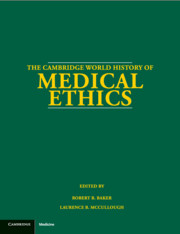Book contents
- Frontmatter
- PART I AN INTRODUCTION TO THE HISTORY OF MEDICAL ETHICS
- PART II A CHRONOLOGY OF MEDICAL ETHICS
- PART III DISCOURSES OF MEDICAL ETHICS THROUGH THE LIFE CYCLE
- 3 Medical Ethics through the Life Cycle in Hindu India
- 4 Medical Ethics through the Life Cycle in Buddhist India
- 5 Medical Ethics through the Life Cycle in China
- 6 Medical Ethics through the Life Cycle in Japan
- 7 Medical Ethics through the Life Cycle in Europe and the Americas
- 8 Medical Ethics through the Life Cycle in the Islamic Middle east
- PART IV THE DISCOURSES OF RELIGION ON MEDICAL ETHICS
- PART V THE DISCOURSES OF PHILOSOPHY ON MEDICAL ETHICS
- PART VI THE DISCOURSES OF PRACTITIONERS ON MEDICAL ETHICS
- PART VII THE DISCOURSES OF BIOETHICS
- PART VIII DISCOURSES ON MEDICAL ETHICS AND SOCIETY
- Appendix: Biographies: Who Was Who in the History of Medical Ethics
- Bibliography
- Index
4 - Medical Ethics through the Life Cycle in Buddhist India
from PART III - DISCOURSES OF MEDICAL ETHICS THROUGH THE LIFE CYCLE
Published online by Cambridge University Press: 28 May 2012
- Frontmatter
- PART I AN INTRODUCTION TO THE HISTORY OF MEDICAL ETHICS
- PART II A CHRONOLOGY OF MEDICAL ETHICS
- PART III DISCOURSES OF MEDICAL ETHICS THROUGH THE LIFE CYCLE
- 3 Medical Ethics through the Life Cycle in Hindu India
- 4 Medical Ethics through the Life Cycle in Buddhist India
- 5 Medical Ethics through the Life Cycle in China
- 6 Medical Ethics through the Life Cycle in Japan
- 7 Medical Ethics through the Life Cycle in Europe and the Americas
- 8 Medical Ethics through the Life Cycle in the Islamic Middle east
- PART IV THE DISCOURSES OF RELIGION ON MEDICAL ETHICS
- PART V THE DISCOURSES OF PHILOSOPHY ON MEDICAL ETHICS
- PART VI THE DISCOURSES OF PRACTITIONERS ON MEDICAL ETHICS
- PART VII THE DISCOURSES OF BIOETHICS
- PART VIII DISCOURSES ON MEDICAL ETHICS AND SOCIETY
- Appendix: Biographies: Who Was Who in the History of Medical Ethics
- Bibliography
- Index
Summary
INTRODUCTION
Birth, development, decay, death – these form the biological base line of human existence. The idea of cycle suggests that there is something similar about the beginning and the end of the process – in this case vulnerability and dependence. To say more is to enter into the field of comparative religion and culture, for it involves cultural notions of time, cosmos, and human destiny. The concept of cycle is particularly appropriate for Buddhism (and Hinduism: see Chapter 3) become the notion of time is cyclical. The cycle of a human life is a microcosm of the cycles of the cosmos (an idea repudiated by Western religions with their linear view of time). The cycles of life are viewed ambivalently in Buddhism (and Hinduism): They are negative in the sense that they represent ignorance and bondage (which includes not only human but also animal and plant life); the human life cycle is also viewed positively, however, because it represents an opportunity for liberation, escape from the cycles of life altogether.
Just as the understanding of cycle involves cultural information about the nature of time, cosmos, and destiny, so does the understanding of the cycle's stages. Cultures divide the human life cycle in different ways; the number of stages and their length of time differ. They also ritually mark these stages in distinctive ways, and, of course, they assign different meanings to the purpose of the stages.
- Type
- Chapter
- Information
- The Cambridge World History of Medical Ethics , pp. 113 - 125Publisher: Cambridge University PressPrint publication year: 2008
- 1
- Cited by



